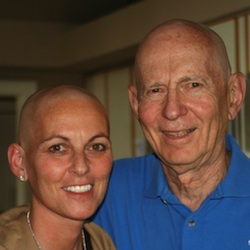By Lillian Cohen-Moore, other
Not all cancers are the same. On occasion, gene mutation plays a role in cancer risk. Women who inherit a mutated copy of the gene known as BRCA are at increased risk for breast cancer, and many women are unaware of the role BRCA plays in both risk and treatment options, particularly among Ashkenazic Jews. Women with a mutated BRCA gene are estimated to have a five-times-higher risk of breast cancer, according to the National Cancer Institute.
With October designated as Breast Cancer Awareness Month, several local Jewish women shared their experiences: Esther Herst, Dawn Schiller, Eva and Elaine Corets, and Michelle Sloan all talked about unique aspects of the disease, while common threads ran through their stories about dealing with the disease.
Sisters Elaine and Eva Corets, both BRCA positive, went through breast cancer in close succession. Elaine was diagnosed in 2002, during an annual exam. Living alone and away from family, “it took me awhile to really take it in, to process and grieve,” she said. “I was very matter of fact, at the start, not letting myself dwell.”
Then, a few years later, Elaine’s sister received the same diagnosis after finding a lump during a self-examination.
“When my sister Eva was diagnosed,” Elaine said, “I really grieved through that process. It brought back things I thought I had been finished with.”
Eva, however, was able to look to her sister for support.
“Fortunately, because Elaine has been through treatment, she was there for me,” Eva said. “The rest of my family gave any support they could.”
Michelle Sloan was diagnosed when her kids were still small.
“When I was first diagnosed, my kids were 5 and 9, and I told them I wanted their lives to be normal,” she said. “I wanted to do everything I could to make life stay normal.” Though Michelle was determined to stay productive and independent, she still wanted her kids to know things were different.
“On chemo days, the first time, I’d leave them a shirt in their room, or a little gift, that they could wear and be close to me that chemo day,” she said. The tradition has continued through another diagnosis and a positive BRCA test.
Each family has had unique ways of coping. In the case of Dawn Schiller, who wrote a memoir titled Wink about her experience with breast cancer, she said her diagnosis changed how she approaches others.
“I’m typically a pretty closed person, and one of my son’s friends had a mom who had breast cancer,” Schiller said. “I was so scared and nervous, and I called her. She was amazing. She said after cancer, I’d be an open book.”
Schiller met with the woman and another cancer survivor at Starbucks to talk about the process.
Later, “when a friend just got diagnosed as I was ending treatment,” Schiller said, “we went to Starbucks. It was wonderful to see how you can be a part of a bigger thing, much bigger than yourself.”
Putting her experience into book form was cathartic for Schiller.
“I’ve always loved to write,” she said. “It’s just a personal walk through what happened, my family’s responses. We’re very candid.”
Esther Herst was an “open book,” as well, only she spoke through e-mail updates on how she was doing.
“As soon as I was diagnosed, I started e-mailing people. I’ve done one after every major milestone — diagnosis, surgery, chemo, my haircut,” Herst said.
Her cancer odyssey began this past June with three words: “This feels weird.”
That came from Herst’s physician during an exam that led to her breast cancer diagnosis this past June. Herst has no familial history, and a negative result for BRCA gene abnormalities.
Eva Corets also had regular e-mail updates about her progress. including the 2007 announcement of her diagnosis: “I am going to fight this with everything I have got, with both strength and courage, chazak v’ematz,” she wrote
Though these women have survived cancer, they know others haven’t been as fortunate. Still, survivor is a word they don’t always care to use.
“That’s not how I define myself,” said Elaine Corets. “I’m Elaine, and I have other things that make me who I am, and it’s not thinking about if I’m going to get sick again.”
But they still have plenty to say about their disease. Schiller said she prefers to take things more slowly these days.
“Everything in life isn’t brain surgery,” she said. “Appreciate the pace of life.”
Sloan’s advice is about trusting instinct: “Listen to your body, and don’t be afraid of going to the doctor. Do self-exams, and take good care of yourself.”
Eva Corets, who approached her diagnosis with fortitude, said, “It’s not the end of the world, and it’s treatable,” she said. “It’s not a death sentence. But you have to fight.”
Herst sounds a call to strength and self-reliance. “Annual exam. Self-exam. Anything you think is weird, get it checked out. Given medical technology today? Don’t be afraid. Just go for it. Let it take you where it will, and keep a very open mind and a very open heart. And don’t let the bastards get you down.”
